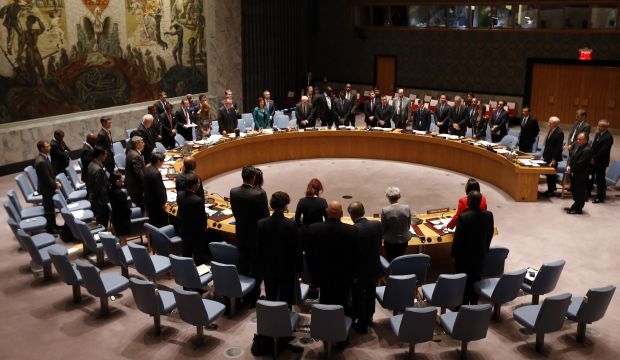
Delegates stand during a moment of silence in honor of victims of terrorism at a meeting of the United Nations Security Council regarding the threat of foreign terrorist fighters during the 69th session of the UN General Assembly at UN headquarters, Wednesday, September 24, 2014. (AP Photo/Jason DeCrow)
At a meeting chaired by US President Barack Obama, the 15-member council unanimously adopted a US-drafted resolution that compels countries to “prevent and suppress” the recruitment and travel of militant fighters to foreign conflicts.
The UN action reflects mounting international concern over rising numbers of foreign fighters joining the ISIS militant group and the threat they pose when returning home. Some 12,000 fighters from more than 70 nations have joined extremist groups in Syria and Iraq, experts say.
British Prime Minister David Cameron told the Security Council that the beheading of two American journalists and a British aid worker by a fighter with an apparent British accent “underlines the sinister, direct nature of this threat.”
The council resolution is under Chapter 7 of the UN Charter, which makes it legally binding for the 193 UN member states and gives the Security Council authority to enforce decisions with economic sanctions or force.
It targets fighters traveling to conflicts anywhere in the world, but does not mandate military force.
Obama is building a global coalition against ISIS, which has captured swaths of Syria and Iraq and urged its followers to attack citizens of various countries. The United States has led air strikes against the group in Iraq and Syria.
“The words spoken here today must be matched and translated into action,” Obama told the Security Council after the adoption of the resolution. “For if there was ever a challenge in our interconnected world that cannot be met by one nation alone, it is this—terrorists crossing borders and threatening to unleash unspeakable violence.”
Obama chaired the Security Council because the United States is president of the body for September.
The UN resolution expresses concern that “foreign terrorist fighters increase the intensity, duration and intractability of conflicts, and also may pose a serious threat to their states of origin, the states they transit and the states to which they travel.”
Australian Prime Minister Tony Abbott told the council that the passports of more than 60 Australians had been suspended to stop them from joining extremist groups in the Middle East. Both Abbott and Cameron outlined their efforts to strengthen laws.
However, some rights groups have raised concerns it could lead to “abusive counter-terrorism policies and practices.”
“The resolution says nothing about due process protections, yet calls on states to apprehend people at borders. And it encourages states to prosecute terrorism, while permitting broad definitions of the term,” said Andrea Prasow, deputy Washington director for Human Rights Watch.
Coinciding with the adoption of the resolution, the UN Security Council Al-Qaeda sanctions committee blacklisted on Tuesday more than a dozen foreign extremist fighters, fundraisers and recruiters tied to militant groups in Syria, Iraq, Afghanistan, Tunisia and Yemen.
